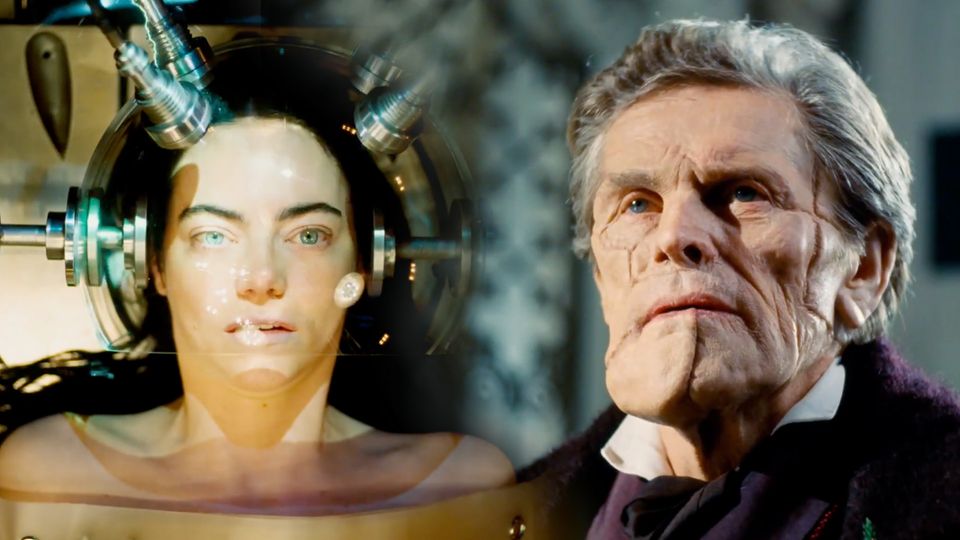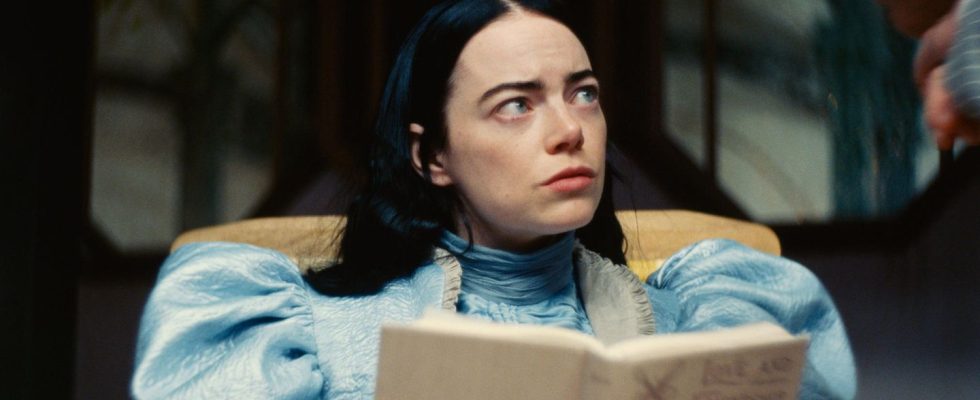Movie review
“Poor Things” in the cinema
Emma Stone shines as the shameless Frankenstein Barbie. The film only has one problem
Emma Stone as the incarnated experiment Bella in “Poor Things”
© PR
The pictures! The costumes! And of course: Emma Stone. “Poor Things” is a fantastic, wild, bizarre event of a film – with a blind spot.
What happens when a woman discovers the world without shame? This is what the award-winning film “Poor Things” is about; the unusual comedy is now being shown in German cinemas. The crazy story goes like this: The doctor Godwin Baxter (Willem Dafoe), his face disfigured with scars, the house full of body parts and dubious experiments, finds the lifeless body of a woman. She is pregnant and has just committed suicide. He inserts her own infant’s brain into her body, resuscitates her, and watches the child develop in the adult woman’s body. Bella, played by Emma Stone, is thriving. Until she blatantly masturbates at the breakfast table.
It’s the first of many times where Bella’s radical shamelessness clashes with our society’s social norms. “Poor Things” is about (female) self-determination, (male) control and moral concepts – and who shapes them. Bella’s world is initially determined by her creator Godwin, whom she appropriately only calls “God”. Since she has apparently reached her teenage years, she is to be quickly married to God’s good assistant Max (Ramy Youssef). But Bella doesn’t even think about it, preferring to run away with the smarmy daredevil Duncan Wedderburn (Mark Ruffalo). God lets them go on the journey. First stop: Portugal.

“The worst thing women can do!”
In Lisbon, Bella indulges in sex and alcohol, stuffs herself with pastries and longs to discover the world. The way she holds up a mirror through her naivety to Duncan, who is increasingly overwhelmed by her, and to “sophisticated society” creates wonderfully funny moments. Decency? Monogamy? Discipline? Bella doesn’t know anything. The wild journey continues until the unlikely couple find themselves penniless in Paris, where Bella ends up in a brothel looking for money.
One of the funniest moments comes when Duncan, out of anger and desperation, throws an eclair he had bought with his money onto the floor while Bella takes a hearty bite. “That’s the worst thing you could do as a woman!” he accuses her. But Bella also approaches this with a curious, almost scientific approach that she learned from God. In one sequence, for example, she questions the system in the brothel and suggests that the women could choose the men. She doesn’t understand why a man would want to sleep with a woman when she obviously doesn’t want to. “Some men like it that way,” is the short answer, and the sentence says a lot about how our world works and what we accept for granted.
A film with an unusually large number of sex scenes
The fact that the whole thing works is, first and foremost, thanks to Emma Stone. The Oscar winner is simply brilliant in “Poor Things”, there is no other way to put it. Stone turns Bella into a fascinating Frankenstein doll that makes all “Weird Barbies” look pale. Her awkward gait alone is worth seeing. With dyed black hair and equally dark eyebrows, she plays this woman who looks at the world completely unbiased and shamelessly discovers power, money and, above all, her sexuality. The film features an unusual amount of sex for an American comedy, especially one with a movie star of the caliber of Emma Stone. The freedom of movement is certainly also due to the relationship of trust with director Yorgos Lanthimos, with whom Stone already worked on “The Favourite”.
Her performance in “Poor Things”, for which she already received the Golden Globe for Best Actress in a Comedy, is the film’s one sensation. The other is the unusual visuals: costumes, camera angles, backdrops – almost everything is unique, like never seen before. And at the same time it evokes memories, for example of Expressionist films. This is an art that director Yorgos Lanthimos demonstrates here in a way that is rarely seen. For example, he works with distorted perspectives through a fisheye lens or jumps at high speed from the black and white filmed Frankenstein laboratory into the colorful life in Lisbon. Bella’s world is peppered with surrealistic elements, her clothes are doll-like and a real feast for the eyes.
Where are the female characters?
What’s also interesting is how much the material from 1992, which is based on the book of the same name by Scottish author Alasdair Gray, captures the spirit of the times. It is certainly no coincidence that “Barbie” and “Poor Things,” two films about artificially created women in search of self-determination, are currently receiving attention. At a time when women in the United States and elsewhere in the world are once again fighting for the right to make decisions about their bodies, feminist issues are entering the mainstream.
But “Poor Things” also leaves behind unintentional discomfort whenever the feminist message is sold too shallowly. For example, Bella supposedly remains unaffected by a rape in a brothel and simply makes fun of the john afterwards. It is the blind spot of the film that on the one hand it describes an emancipatory journey and criticizes the patriarchy, and on the other hand it reproduces the typically male view of women – and does not always seem to notice this. In addition to Emma Stone, hardly any other women act as protagonists: a promising acquaintance with an older lady is only touched on, a friend from the brothel is immediately turned into a lesbian lover. Bella’s burgeoning interest in politics and social injustice is only touched on superficially. Instead, it’s always about her relationships with different men, all of whom want to control her in one way or another – some with good intentions, others with less good intentions. So male archetypes are once again the focus. A little less sex and a more complex understanding of what it means to be a woman in our world would have benefited the story.
Nevertheless, “Poor Things” is a fantastic, wild, bizarre event of a film that is worth going to the cinema for.
“Poor Things” will be showing in German cinemas from January 18th


